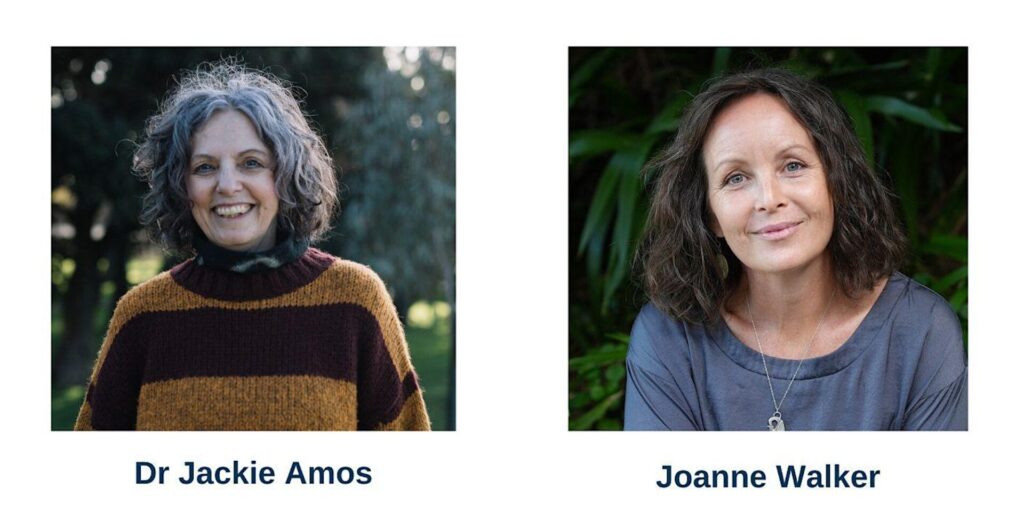Pathways from Power to Intimacy
A 2-day workshop exploring power struggles within relationships, their roots in traumatic emotional wounds in infancy, and pathways to healing.
For psychotherapists, psychiatrists, psychologists, counsellors & mental health professionals.
Presented by: Dr Jackie Amos & Joanne Walker
Date: 2-3 May, 2024
Why attend this event
Take a deep dive into understanding attachment theory. Gain a comprehensive understanding of how trauma in infancy and early childhood shapes individuals' relational maps. We will provide detailed theoretical insights, as a foundation for utilising this model in therapy.
Learn a practical mapping process for your work with clients. Acquire a toolkit for bridging theoretical knowledge with the lived experiences of clients. We will present a mapping process to help identify and address embodied relational wounds, fostering a nuanced approach to working with individuals trapped in distressing intimate partnerships.
Participate in experiential learning with experts in the field. This experiential process will enhance your ability to navigate and effectively engage in this challenging space. We will emphasise the importance of managing your presence, providing practical skills to support you in your work with people who are experiencing the painful struggle between self-preservation and maintaining healthy relationships.
Program structure Day One
In the first day of this training we will introduce, in detail, the theoretical framework that explains the links between relational trauma in infancy and, power and powerlessness in adult intimate relationships. We will outline the elements of the practical mapping process. Day Two
Drawing on the participants own experiences (personal or professional) we will deepen our understanding of the map by practicing using the map. This will support a discussion of common themes encountered in practice and the relationship of the mapping process to Gestalt concepts
Venue | Elie, Gestalt Centre Training Campus, 27 Royal Parade, Parkville, Victoria
Date | Thursday & Friday 2–3 May 2024,
Time | 9.30am - 4:30pm
Cost | Full registration $750 / GTA Student $650. Fee includes GST.
Overview
Attachment theory reminds us that long before we make cognitive maps of relationships, we make embodied maps, including maps of relational threats, relational wounds, and the associated creative adaptations. Identifying these embodied relational wounds, resulting from millions of moment-to-moment interactions, can be difficult in practice. Mapping how these harmful interactions impact us as adults, either in subtle everyday ways or in situations of extreme violence, is the portal back to the wound. One of the impacts is the painful struggle between maintaining the self or being in relationship, a common reason for people to seek therapy. In its most intense form, this struggle manifests as intimate partner violence.
In this workshop, the presenters will offer an integrated theoretical and practical guide to navigating this territory. We will provide a novel way to understand and work with individuals trapped in distressing intimate partnerships, with or without overt violence, outlining a pathway from power and powerlessness to healthy intimacy.
We will explore 3 inter-related themes. We will provide detailed theory about the impact of trauma in infancy and early childhood to provide scaffolding for practitioners wanting to use this model. We will offer a practical mapping process that acts as a bridge between the practitioner’s knowledge and the lived experience of clients. We will facilitate an experiential process that supports therapists to manage their presence and work effectively in this space.
View flyer
https://www.gestaltcentre.com.au/
Jackie is a child, adolescent and family psychiatrist, gestalt psychotherapist and clinical academic with more than 25 years of experience working psychotherapeutically with adults, children and families caught in intergenerational cycles of neglect and abuse. She has worked in both government child and adolescent mental health and intensive family support service settings. Jackie is now leading the implementation of her doctoral research in Centacare, a large NGO in Adelaide, using her theoretical model to inform the development of therapeutic case workers.


